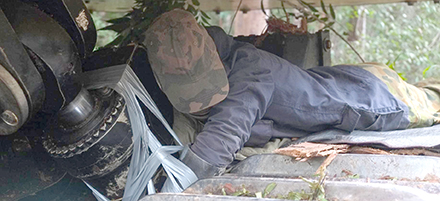The protestors are back, frustrating timber industry workers in New South Wales and Western Australia and leaving others in Tasmania slightly bemused. And then there is the Wilderness Society which has taken its aim to shut down the native timber industry in Australia to the world. That campaign is possibly the most insidious of all. Source: Bruce Mitchell
The Wilderness Society’s is trying to convince regulators in the US and the European Union that some of the timber harvested by VicForests may have been illegally harvested.
The claim is that the US and the EU may be importing illegally harvested in timber in breach of local laws.
What a load of potentially dangerous rubbish.
VicForests CEO Monique Dawson tried to convince the Society that what it was planning to say in a press release was blatantly wrong.
Among other things, she pointed out that VicForests has been certified to Australia’s national forestry standard endorsed by the PEFC since 2007.
This certification, she said, could not have been maintained if VicForests had been involved in illegal logging.
She said that any complaint to EU and German regulators was confirmation that the Wilderness Society was more interested in conducting stunts than seriously addressing global issues surrounding the invidious trade in illegal timber.
Australian Forest Products Association CEO Ross Hampton went further.
He said the Wilderness Society was effectively trivialising the global criminal trade in illegally logged forest products that leads to deforestation, poor working conditions and environmental vandalism.
It’s a cunning ploy by the Wilderness Society which has some credibility internationally.
While its appeal will probably fall on deaf ears – the regulators overseas it is hoped will just jump on the phone and discover it’s all a bit of a furphy – it does raise the risk of sowing a tiny bit of doubt in some minds in the US and EU.
And probably that’s just what the Wilderness Society is hoping for.
Meanwhile in another stunt, this time in Tasmania, the Bob Brown Foundation this week made the spurious claims that that Sustainable Timber Tasmania was planning to harvest giant trees in the Styx Valley area of Southern Tasmania in mid-August.
Nothing could have been further from the truth, which was pointed out by both SST and the State’s Resources Minister Guy Barnett.
That led to the Foundation making the even sillier claim that it had scored a “victory” by getting the logging stopped.
Mr Barnett simply pointed out that this was a new low for the Foundation.
“Facts have never been high on the agenda for environmental extremists,” Mr Barnett said.
It has been suggested privately that the Foundation is starting to bare its teeth again after what it sees as success in Victoria where the native timber industry is set to be closed down by 2030.
But the Foundation got its 15 minutes of fame in what has also been seen by some as little more than a fund raising exercise.
In Western Australia and northern New South Wales it’s a repeat of the campaign of disruption at logging sites which have been plaguing Victoria for some time now.
In NSW, the tactics are sadly common; protestors are chaining themselves to equipment, walking onto coupes during harvesting, intimidating crews and obstructing logging trucks.
It’s frustrating, annoying, costly, dangerous for everyone involved (including the protestors) and above all, illegal.
Unlike Victoria, the police in NSW appear to be working with the logging company, which has been the target of the protests and at least one protestor has been arrested.
In WA, it’s a similar story where protestors have disrupted legal and sustainable timber operations at Helms, near Nannup.
In an echo of the Tasmanian situation the protestors claim that old growth forest is being harvested. It’s not. The operation at Helms does not include any areas of old growth forest.
Again, why let facts get in the way.
Sadly, the protestors may have actually selfishly done more to harm the environment than “protect” it.
The majority of the Helms operation is dieback infested, which was identified as part of the extensive assessment process required prior to approval.
“We have strict hygiene management practices that we must uphold to avoid spreading dieback, and we are seriously concerned that the protestors have no regard for these practices as they run around the forest,” Forest Industries Federation of WA Executive Director Melissa Haslam said.
Meanwhile, the government and police in South Australia are taking steps to help facilitate cross border traffic in the Green Triangle to help the timber industry cope with the restrictions of the pandemic.
The industry-generated plan to allow greater cross border movements for forest industry staff was presented to South Australian Premier Steven Marshall and Police Commissioner Grant Stevens this week during their visit to the region.
The virus has delivered the Green Triangle – which straddles two States – enormous logistical problems.
The proposal calls for freedom of movement for harvesting, silviculture and forest managers to isolated forest locations to undertake works essential to maintaining business flow to the more than 150 businesses the sector supports across the Green Triangle.
With luck this industry proposal will go a long way towards ensuring that at a time when the country needs all the economic activity it can muster the Green Triangle can continue to contribute to the nation’s recovery post-pandemic.
It’s probably something the Wilderness Society and the protestors should be considering instead of trying to shut parts of the timber industry down.






